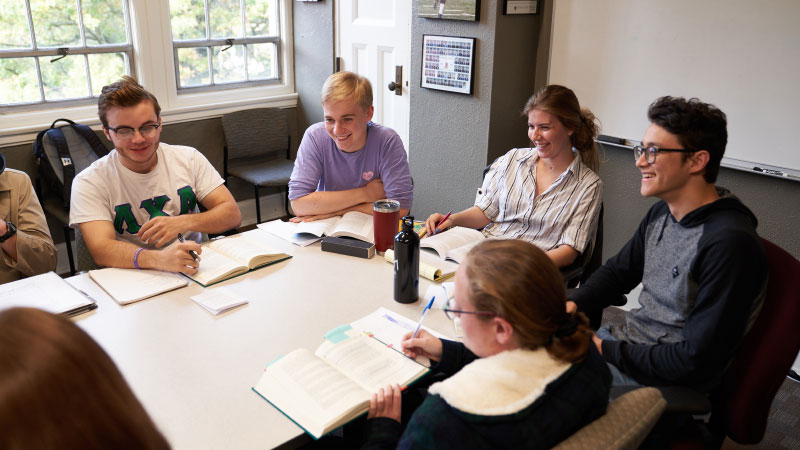The Cognitive Science Major
Cognitive Science is a rapidly growing field, both nationally and internationally. The United Nations University, the National Science Foundation, and the US Chamber of Commerce have all recognized cognitive science as one of the top four sciences to see unprecedented growth in the 21st century along with genetics, nanotechnology, and information technology. Cognitive scientists work in a variety of areas, including education, economics, computer science and engineering, electrical engineering, mathematics, neuroscience, cognitive psychology, philosophy, and biology.


The Cognitive Science program at UE is one of the only undergraduate-only Cognitive Science programs in the country. Its small size and low student/faculty ratio ensures that each student receives close personal attention from faculty and individualized schedule planning to help them to achieve their academic goals. The curriculum is designed to give students a solid foundation in the core ideas and methods of cognitive science while allowing them considerable freedom to specialize in ways that they find interesting and meaningful. By allowing a range of options for the methods requirement, the cognitive science major falls easily within the reach of philosophy, psychology, economics, applied mathematics, and neuroscience majors, along with most other humanities majors. Triple majors are also possible with careful schedule planning.
The program features many unique and innovative experiences for students. The weekly Proseminar in Cognitive Science is an opportunity for majors to gather and to discuss research, solve group problems, and develop the "soft skills" necessary to thrive in a research or professional environment. It also allows cognitive science majors working in diverse areas to share ideas and connect with one another, forming strong student cohorts. The Seminar in Cognitive Science models the structure of seminars at top graduate schools and teaches students the analytical and research skills necessary to do successful independent research on open problems in the field. These courses are taught by program faculty on topics within their research specialties. Faculty research interests currently include embodied cognition, brain-computer interfaces, social networking, complex adaptive systems, music cognition, attention, skill acquisition, robotics, the neuroscience of free will, and decision theory.
Major Requirements
44 or 48 hours, depending on proseminar credits and how students meet the methods requirement.
Foundational Requirements (12 to 15 hours)
- COGS 100, 200, 300 and 400 – Proseminar in Cognitive Science (0 to 3 hours)
- COGS 111 - Introduction to Cognitive Science (3 hours)
- NEUR 125 - Introduction to Behavioral Neuroscience (3 hours)
- PHIL 221 - Early Modern Philosophy (3 hours)
- PHIL 231 - Symbolic Logic (3 hours)
Methods Requirements (8 or 9 hours)
Students may meet their methods requirement in one of five disciplines. Each option was carefully selected to lay out the skills necessary to undertake cognitive science research in the area of interest that most suits the students individually. (Note that some options have prerequisites that the student must take in advance of taking courses to meet the methods requirement.)
- Biology - BIOL 107 General Biology (4) and BIOL 320 Evolution and Ecology (4) – includes five hours of lab experience
- Computer Science – CS 210 Fundamentals of Programming I (3), CS 215 Fundamentals of Programming II (3), and either CS 290 Object-Oriented Programming (3) or CS 315 Algorithms and Data Structures (3)
- Economics - QM 227 Quantitative Methods (3), ECON 300 Regression Analysis (3), and ECON 400 Econometrics (3)
- Mathematics - MATH 365 Probability (3), MATH 466 Statistics (3), and either MATH 370 Discrete and Combinatorial Mathematics (3) or MATH 373 Numerical Methods (3)
- Psychology - PSYC 245 Statistics for Psychologists (4) and PSYC 246 Research Methods in Psychology (4)
Upper Division Requirements (21 hours)
- PSYC 355 - Sensation and Perception (3 hours)
- NEUR 126 - Neuroscience Techniques (2 hours)
- PSYC 366 - Cognitive Psychology (3 hours)
- PHIL 445 - History and Philosophy of Science (3 hours)
- PHIL 447 - Philosophy of Mind (3 hours)
- PHIL 451 – Philosophy of Agency (3 hours)
- COGS 345 – Complex Systems (3 hours)
- COGS 498 - Seminar in Cognitive Science (3 hours)
Minor Requirements
18 hours to include COGS 111 Introduction to Cognitive Science (3), NEUR 125 Introduction to Behavioral Neuroscience (3), COGS 498 Seminar in Cognitive Science (3), plus three elective courses from the following:
- PSYC 355 Sensation and Perception (3)
- NEUR 126 Neuroscience Techniques (2)
- PSYC 366 Cognitive Psychology (3)
- PHIL 445 History and Philosophy of Science (3)
- PHIL 447 Philosophy of Mind (3)
- PHIL 451 Philosophy of Agency (3)
Substitutions for the three elective courses are permitted with pertinent courses from other areas on the approval of the director of cognitive science. These can include courses from anthropology, biology, computer science, economics, education, engineering, mathematics, or other courses from philosophy and/or psychology.
Office Phone
812-488-1045
Office Email
dj4@evansville.edu
Office Location
Room 343, Olmsted Administration Hall
